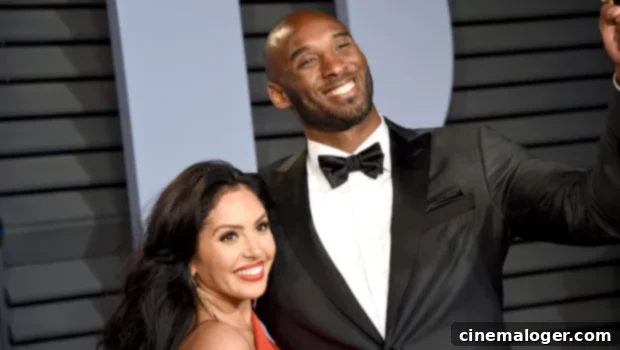Vanessa Bryant Sues L.A. Sheriff’s Department Over Unauthorized Kobe and Gianna Crash Photos: A Battle for Dignity and Privacy
Eight months after the tragic helicopter crash that claimed the lives of NBA legend Kobe Bryant, his 13-year-old daughter Gianna Bryant, and seven others, Vanessa Bryant initiated legal action against the Los Angeles County Sheriff’s Department. Filed on September 17, 2020, the lawsuit accuses the department of causing her immense emotional distress and compounding her grief through the unauthorized taking and sharing of graphic photos from the January 26, 2020 crash site. This legal battle represents Vanessa Bryant’s courageous fight for justice, accountability, and the protection of her family’s dignity in the wake of an unimaginable tragedy.
The devastating loss of her husband and daughter plunged Vanessa Bryant into profound mourning. However, her anguish was further exacerbated by revelations that members of the L.A. Sheriff’s Department allegedly exploited the horrific scene for personal gratification. According to the legal documents obtained by HollywoodLife, Vanessa, 38 at the time of filing, claimed that “no fewer than eight sheriff’s deputies at the crash site pulled out their personal cell phones and snapped photos of the dead children, parents, and coaches.” These actions, she asserted, were not for official investigative purposes but rather for the deputies’ “own personal gratification,” a profound betrayal of public trust and human decency.
The lawsuit details a disturbing pattern of behavior where these “gratuitous images” circulated widely within the department. Deputies reportedly “displayed them to colleagues in settings that had nothing to do with investigating the accident.” The most egregious example highlighted in the legal filing describes one deputy attempting to “impress a woman at the bar” by bragging about his presence at the crash site and showing her graphic photos of the victims. This appalling conduct illustrates a severe lack of professionalism and empathy, turning a sacred and tragic scene into an object of casual, disrespectful display among law enforcement personnel. The implications of such actions extend beyond mere negligence, striking at the core of victim privacy and the ethical obligations of those sworn to serve and protect.
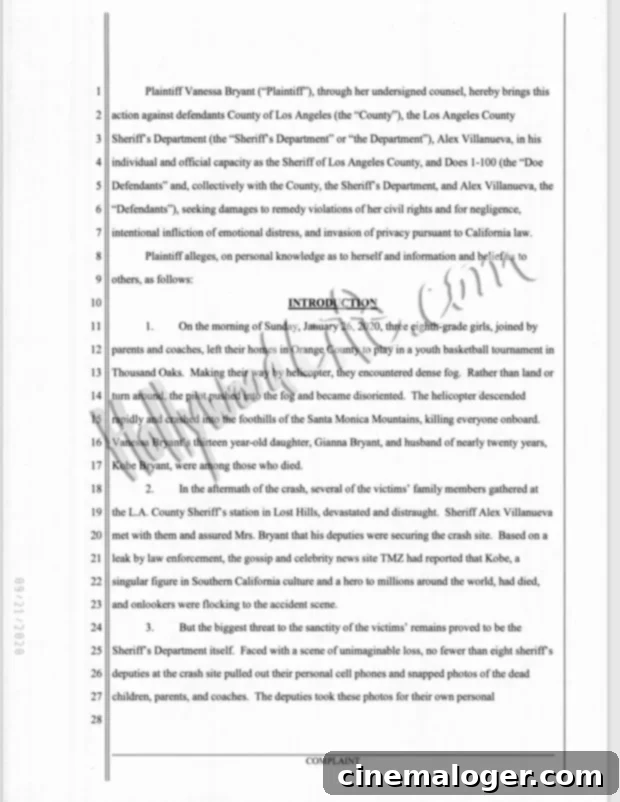
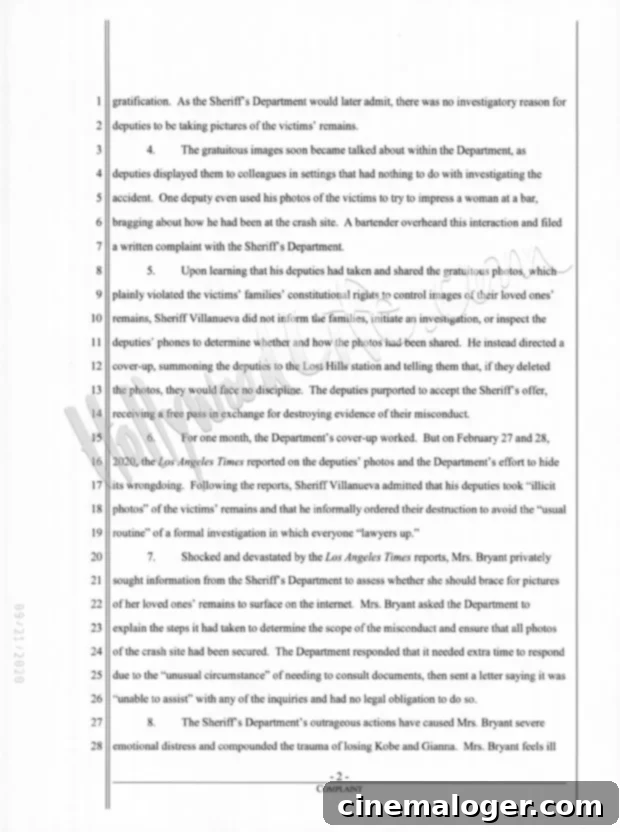
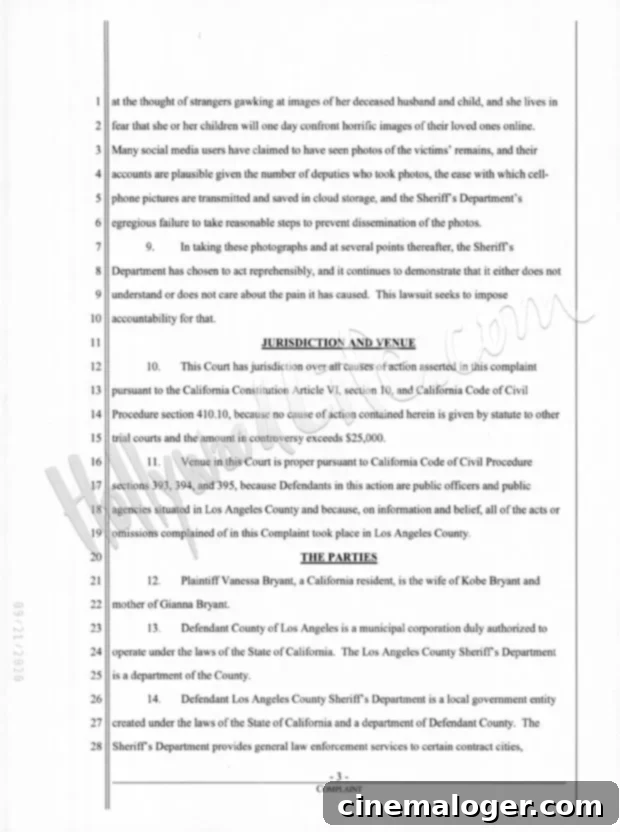
The existence of these unauthorized photographs came to light through a detailed report published by the Los Angeles Times. Upon learning of the potential breach of privacy, Vanessa Bryant immediately “privately sought information from the Sheriff’s Department” to ascertain the extent of the damage and whether she should “brace for the pictures of her loved ones’ remains to surface on the internet.” Her urgent inquiries were met with bureaucratic stonewalling, as the department initially cited the need for “extra time to respond due to the ‘unusual circumstance’ of needing to consult documents,” only to later send “a letter saying it was ‘unable to assist’ with any of the inquiries and had no legal obligation to do so.” This unhelpful response intensified her fears and deepened her conviction that the department was not acting transparently.
Further exacerbating the situation, Vanessa Bryant has accused Sheriff Alex Villanueva of an attempted “cover-up.” She alleges that Sheriff Villanueva instructed his deputies that if “they came clean and deleted the photos, they would not face any discipline.” This alleged directive suggests an attempt to circumvent official investigation and accountability, prioritizing the department’s image over justice for the victims and their families. Such a perceived cover-up fundamentally erodes public trust in the institutions designed to uphold law and order. HollywoodLife reached out to the sheriff’s department for comment on these grave accusations, highlighting the public’s demand for transparency and justice.
The core of Vanessa Bryant’s lawsuit hinges on the profound emotional toll these “outrageous actions” have taken on her. She explicitly states that the sheriff’s department’s conduct has caused her “severe emotional distress and compounded the trauma of losing Kobe and Gianna.” The thought of strangers viewing images of her deceased husband and child fills her with dread and revulsion. Her legal documents powerfully convey her anguish, stating she feels “ill at the thought of strangers gawking at images of her deceased husband and child.” This fear is not abstract; she “lives in fear that she or her children will one day confront the horrific images of their loved ones online.” The proliferation of digital media and social platforms means that once images are leaked, they are virtually impossible to fully retract, creating a perpetual source of anxiety for the family. The lawsuit underscores that many individuals on social media have already claimed to have seen these horrifying photos, making her fears acutely real and immediate.
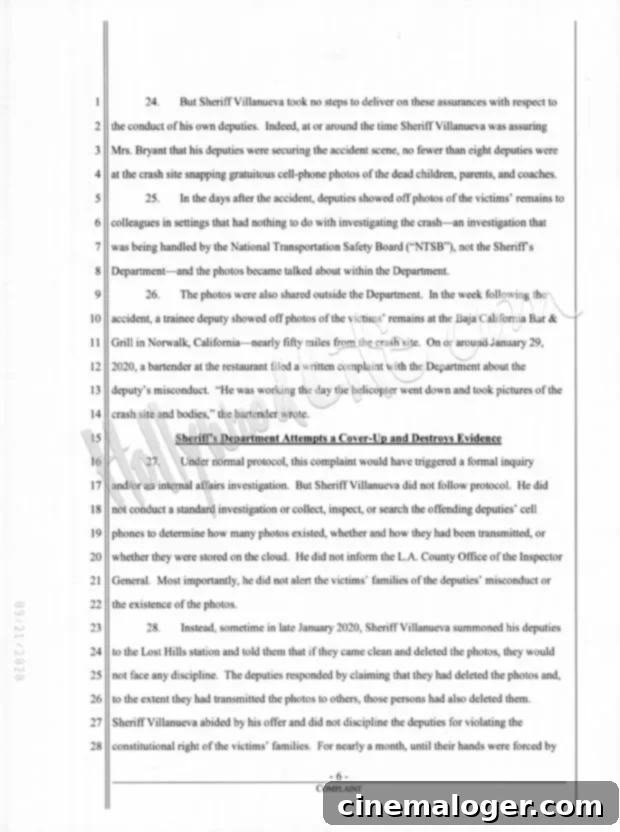
Sheriff Alex Villanueva publicly acknowledged in March 2020 that eight deputies were involved in taking or sharing graphic photos of the crash scene. He stated that he ordered these images deleted. However, a critical loophole in department policy came to light: while the department prohibits taking and sharing pictures of crime scenes, this policy, according to Sheriff Villanueva, “doesn’t apply to accidents.” This distinction is a central point of contention in the lawsuit, as it suggests a glaring deficiency in existing protocols that failed to protect the dignity of accident victims and their families. For a public official to admit to such a policy gap while simultaneously ordering the deletion of evidence rather than initiating a transparent investigation raises serious questions about accountability and ethics.
In his public statements, Sheriff Villanueva emphasized his priority: “That was my No. 1 priority, was to make sure those photos no longer exist,” he told NBC News in March. He further elaborated on the department’s handling of the situation, stating, “We identified the deputies involved, they came to the station on their own and had admitted they had taken them and they had deleted them. And we’re content that those involved did that.” This assertion of being “content” stands in stark contrast to Vanessa Bryant’s profound distress and allegations of a cover-up. The public’s expectation is not just for deletion, but for genuine accountability, disciplinary action, and systemic change to prevent future occurrences of such egregious misconduct.
Vanessa Bryant’s lawsuit seeks significant damages based on several legal grounds: negligence, invasion of privacy, and intentional infliction of emotional distress. The claim of negligence asserts that the sheriff’s department failed in its duty of care to protect the privacy and dignity of the crash victims and their families. The invasion of privacy claim stems from the unauthorized collection and dissemination of deeply personal and horrific images. Finally, the charge of intentional infliction of emotional distress underscores the profound psychological harm caused by the deputies’ callous actions, which deliberately or recklessly disregarded her profound grief and the sanctity of her loved ones’ final resting place. This legal action is not merely about financial compensation; it is a powerful demand for institutional accountability and a clear message that such disrespectful and harmful conduct by public servants will not be tolerated.
The legal battle initiated by Vanessa Bryant resonates far beyond her personal tragedy. It highlights critical issues concerning law enforcement ethics, victim privacy rights, and the profound impact of social media on personal grief. Her unwavering pursuit of justice serves as a testament to her strength and commitment to honoring the memories of Kobe and Gianna, ensuring that their dignity, even in death, is fiercely protected from those who would exploit their tragedy for any reason. The outcome of this lawsuit could set a crucial precedent for how law enforcement agencies handle sensitive information and gruesome scenes, underscoring the imperative for empathy, respect, and stringent protocols to safeguard human dignity in the most vulnerable moments.
